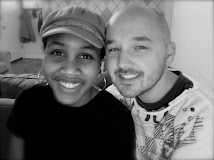Partially, I believe that Facebook has been my main place to leave comments and thoughts. But the 420 character limitation on the social networking go-to has squashed my ability to completely put my brain on paper (or on computer screen, I guess).
Thanks to my recent visit to Portland, I have found that turning the TV off isn't that bad of a thing. Emily Jenkins, a friend from high school, graciously allowed my wife and me to stay at her home in Portland for spring break. It was a great spring break. (I'll probably blog about it later.)
But, while in her home, there was a noticeable difference; she had no TV. Well, she had a TV and a ton of DVDs to watch, but it didn't have an antenna or cable or anything. It didn't bother me one ounce since we were so active while we were there, and it has made me appreciate the lack of bombardment of news and brain-dead sitcoms that consume our lives too much.
So, tonight, thanks to Emily, my TV is off. And I have been reading. I did my daily Bible reading, which was more meaningful earlier in the day as opposed to reading it closer to bedtime.
I've also been reading online articles. Two have caught my attention tonight:
First, a column by David Brooks called "The Sandra Bullock Trade."
In the column, Brooks starts writing about Sandra Bullock's major events that happened this month: her Academy Award win for best actress and the alleged affair her "adulterous jerk" husband had.
He, then, in the column addresses whether fame and fortune or personal relationships make someone happier. Of course, all the interesting studies he points out indicate that "economic and professional success exists on the surface of life, and that they emerge out of interpersonal relationships, which are much deeper and more important."
But the second thing Brooks addresses in his column was a good message for educators:
The second impression is that most of us pay attention to the wrong things. Most people vastly overestimate the extent to which more money would improve our lives. Most schools and colleges spend too much time preparing students for careers and not enough preparing them to make social decisions. Most governments release a ton of data on economic trends but not enough on trust and other social conditions. In short, modern societies have developed vast institutions oriented around the things that are easy to count, not around the things that matter most. They have an affinity for material concerns and a primordial fear of moral and social ones.Yes, our kids need to be prepared to go to college and planning for a career. But even more so, students need to make good social decisions. I think that's why I always promote to my students the idea of getting out of the minute worlds in which they've grown and live somewhere different. What better way to develop better social skills than to be around people who are from different backgrounds or who have a different culture. If you're not exposed to another culture, it's likely that you don't do well socially with people of other cultures. So, that means anytime you're in a social situation with someone not from your cultural background, that can be problematic.
This totally transitions into the second thing I read online tonight. (I apologize for going on and on, but I'm on a roll here.)
Erykah Badu is stirring up a little controversy, according to a music blog I read on Yahoo!, in a new music video for her song "Window Seat."
In the video, which you can watch at her Web site or on the YouTube embedded video above, Badu strips down naked (Yes, it's censored.) at the site where JFK was shot. While I don't completely understand why she chose JFK as a comparison to herself, she's basically making the point that people shouldn't judge what they don't personally understand.
From the Yahoo! blog post:
Very interesting. Does my initial uneasy reaction of her decision to strip down naked publicly make me a societal conformist?By the time Badu reaches the infamous grassy knoll where Kennedy was killed, she is completely nude. A gunshot is heard, her head cocks back, and her limp body falls to the ground. The words "group think" bleed from her head in blue ink.
"Group think that's like a form of thinking that causes you to bury what you really feel inside to please the group so you won't be ostracized by the group," Badu told the Wall Street Journal. "It's a comfort zone that we create for ourselves, and I go outside of that comfort zone."
As Badu's body lies on the ground, she speaks in a narrative voice to explain the message. "They play it safe. Are quick to assassinate what they do not understand," Badu says in the voiceover. "This is what we have become. Afraid to respect the individual."
What do you think about this video? I'd be interested to read your thoughts and comments.
Enough blogging for now; I have to go watch the TV. Oops, I guess I haven't completely quit watching TV. But I do plan to shut off the boob tube unless I have something that I absolutely want to watch. (I going to watch Parenthood — just in case you wanted to know.)



No comments:
Post a Comment